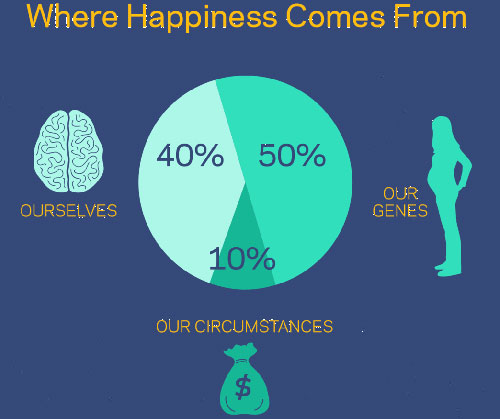How to Be Happy: 10 Scientifically Proven Keys to Feeling Good All the Time (2)
Read the first part of the article
Roadblocks to Happiness and How to Overcome Them

Have you ever daydreamed about owning a bigger home, purchasing a shiny new car, or getting a long-awaited promotion at work? If so, you’ve probably done this for a very specific reason: you believed that these supposed “secrets of happiness” would make you a happier person. We all fall into this pattern of thinking and acting, and many of our major life choices are made with the goal of happiness in mind. Indeed, everything from our relationship choices to where we decide to live is influenced by an internal (often unconscious) decision about whether it will make us happier.
The idea that if something good happens to us, then we’ll be happy, is a very common belief that most of us fall prey to from time to time. It’s called by some the “if/then” style of happiness seeking, and it tends to promote the idea that if we achieve some desirable outcome in our lives, then we’ll be happy. For example, we might tell ourselves that if we were to purchase a beautiful new home, or if we were to move to a new city, then we would be happy.
Although the “if/then” style of thinking is certainly seductive when it comes to our happiness, we all know from personal experience that these sorts of external changes rarely lead to lasting and true well-being. It’s not that good things happening to us don’t make us happy, because they do. It’s just that positive changes like those outlined above make us less happy than we expect, and the gains that we achieve last a much shorter time than we expect.
A classic example of this phenomenon can be seen in studies conducted on lottery winners. Just as we might expect, winning the lottery typically leads to an immediate and sizable boost in terms of a person’s happiness. The problem is that these gains are quite fleeting, almost akin to a happiness “sugar high.” Indeed, within a handful of months, most lottery winners return to their original baseline level of happiness and life-satisfaction.
As it turns out there are many examples like this, of positive changes in our lives that we expect to lead to lasting increases in happiness but don’t. Some common examples of things that many people expect to make them happier but don’t, in the long run, include (but are not limited to):
Money and Income: Most, if not all, people think that money is one of the essential keys to being happy. Once basic needs are met, additional money makes very little, if any, difference in terms of a person’s happiness level. Some estimates suggest that once an annual income of roughly $75,000 is met, additional money makes no difference when it comes to making a person happier.
Geography: Studies show that with the exception of people suffering from Seasonal Affective Disorder, the average person’s happiness is not affected by where they live geographically. Differences do exist when comparing countries, but that is more related to systems of government and/or oppression. Climate and geography, however, do not appear to play a role in happiness.
Getting Married: Research suggests that following an initial boost in happiness (roughly 18 months on average), married individuals tend to revert back to their previous happiness baseline levels.
Having Children: Although there is conflicting research on this topic, numerous studies suggest that day-to-day levels of happiness and life satisfaction fall among parents following the birth of a child, and are particularly low during the teenage years. Only once a child moves off to college or leaves the home do happiness scores tend to revert back to their original baseline among parents.
Physical Attractiveness: Studies show that the people who score the lowest of any profession for happiness are models.
But why do all these seemingly wonderful things have such little (if any) benefit to our long-term happiness? The answer lies in a few key areas, which we will now briefly turn our attention to. As it turns out, there are a handful of factors on how to be happy, making it hard for us to feel lastingly buoyant; three of which we will briefly discuss below.
Hedonic Adaptation
Human beings have a remarkable ability to adapt to changes in their environment. For example, think of the last time you entered a dark movie theater – at first it was probably quite difficult to see, but shortly thereafter your eyes adjusted and you could make your way to your seat. Or consider the way that a rather unpleasant odor stops being so noticeable after a short while. These examples demonstrate a process called physiological adaptation – in other words, our ability to adapt to physiological changes in our environment.
A similar process occurs when it comes to our happiness and is known as hedonic adaptation. This refers to the idea that we tend to “adjust” to so-called hedonic (pleasant) changes in our environment, and find ourselves back to our baseline level of happiness rather quickly. It helps explain, for example, why lottery winners revert to their previous levels of happiness only a few months after they win an enormous sum of money. But it also helps explain why, for example, accident victims who lose the use of their legs return to their prior level of happiness in a somewhat similar time frame.
A key take-home message regarding the psychology of happiness is that hedonic adaptation is neither good nor bad. In fact, the same process that drags us down after something wonderful happens helps bring us back up following tragedy. So just as financial windfalls and strokes of good fortune fade over time, so too do the painful emotions associated with loss and setbacks. But due to its tendency to “undo” the benefits of positive changes in our lives, hedonic adaptation serves as a powerful barrier to lastingly increasing our happiness. And it helps explain why so many of the factors that we normally think will make us lastingly happier (such as more money, a change in appearance, entering a new relationship, and so forth) lose their luster after a short while.
The Genetic Lottery

Our genes play a powerful role in many areas of our lives, from our personalities and our appearance to our risk of certain illnesses and diseases. As it turns out, our genes also play a powerful role when it comes to our happiness levels. Through researching both fraternal and identical twins, as well as non-twin siblings, scientists have come to find that a large portion of our happiness is genetically influenced.
How much of an influence do genes have in this area? Estimates vary, but most studies seem to suggest that our genes account for as much as 40-50% of our level of happiness in life. If you’ve ever known someone, for example, who seems to take setbacks in stride, or always seems to see the glass as “half full,” there’s a strong likelihood that that individual may have hit the genetic lottery when it comes to happiness. Conversely, we all know people for whom being happy seems to be an uphill struggle, and those individuals may have been less fortunate when it comes to a “genetic” predisposition to happiness.
Although our genes play an important role in determining our happiness baseline or “set point,” it’s crucial that we don’t take this message too far. Indeed, it’s better to think of it being akin to weight: Some of us may be naturally heavy or thin, and in the absence of proper diet or exercise we may drift towards where our genes predispose us. However, this does not mean that we’re doomed to be mere reflections of our genetic “set point,” and we are all able to transform ourselves based on the choices and behaviors we engage in, whether in terms of weight or happiness.
Our “Negative” Brain
Have you ever felt as if a dozen good things can happen to you in a day, but a single bad experience is all you can think about when you get home that night? If you are having a hard time figuring out how to become happy in a difficult situation, you’re not alone, and in fact, we can thank another key barrier to happiness for this sort of experience: our very own brain. When it comes to our happiness, it’s worth remembering that our brains developed over the millennia not to be happy, but rather to survive. And sometimes the very things that helped us to survive as a species also make it hard to feel lastingly content, peaceful, and happy.
Life was quite difficult for our early ancestors, with constant threats of famine, warfare, and natural disaster surrounding them at all times. In order to help us to survive, we became highly attuned to threats and danger, and to focus on the negative aspects of our environment rather than the positive ones. And although our world has changed in many ways since that time period, it’s a drop in the bucket from an evolutionary standpoint. As a result, we are still operating with much of the same basic “machinery” that our ancestors did hundreds of thousands of years ago.
Our brain has a built-in “negativity bias” in order to help us survive. This means we remember bad outcomes much more easily than good ones, and negative events impact us much more strongly than positive ones. This negativity bias has been shown to be so strong, that some studies suggest we need to experience several positive events during our day to overcome just a single negative one. The neuropsychologist Rick Hanson has described our brain thusly as being like “Teflon for good, and Velcro for bad.” This negativity bias leads us to feel unhappy and stressed much of the time, especially if we are not actively working on shifting out mindset towards the positive.
What’s Really Under Our Control?
Although the barriers to true happiness listed previously are formidable, they are not insurmountable. And despite all the factors that make it difficult to become happier (such as hedonic adaptation, our genes, and the negativity bias), it is absolutely possible to become lastingly happier. We just need to look in the right place and foster the right kinds of habits.
If the bad news (for some) is that genes account for up to 40-50% of a person’s happiness level, the good news (for all of us) is that our circumstances around us account for only a small portion of our happiness – as little as 10%. Keep in mind, these sorts of external circumstances (how much money we earn, whether we are married or not, where we live, etc.) are where we tend to look to become happier. Yet these things (which can be very difficult to change in the first place), account for only a small portion of our happiness level.
The best news of all is that we are left with an entire 40-50% entirely in our control, and determined by the choices we make, the mindset we cultivate, and the habits we engage in. There are 10 core principles that have been shown to create lasting increases in our happiness levels. Each has been researched extensively, backed by numerous scientific studies, and each has been linked to meaningful changes in a person’s happiness over time and with practice. Best of all, none of these principles are fixed; rather, they are all learnable, and changeable, with effort.
What Are the 10 Keys to Lasting Happiness?

If you need more tips on how to become happy in life, these practices have been strongly linked in many research papers to lasting well-being:
1. Gratitude
Studies show that fostering a sense of gratitude and appreciation for the positive aspects of our lives has a powerful impact on our own happiness level, making it one of the major keys to happiness. By shifting our focus towards the good in our lives, research suggests we can become much happier.
2. Kindness and Compassion
Another crucial element of well-being comes through expressions of kindness and caring towards others. Indeed, numerous studies show that giving to others, whether through formal volunteer work or other means, is one of the most powerful ways to be happy.
3. Self-Compassion
Around 80% of people tend to be harder on themselves than they are on others. Unfortunately, this sort of self-criticism takes a tremendous toll on our well-being. Self-Compassion – earning to treat ourselves with kindness and caring – has been shown to have powerful benefits on our mental and physical health.
4. Mindfulness
Some studies suggest that we spend roughly half of our waking hours mentally detached from the present moment; in other words, we may be physically in one place, but mentally we are somewhere else. This same research suggests that the more our mind wanders, the less happy we tend to be. Mindfulness – the ability to be non-judgmentally aware in the present moment – has been shown to have immense benefits to our happiness and well-being, along with our physical health.
5. Optimism
We’ve all heard it said that it’s best to see the glass as “half full,” but recent research underscores the importance of optimism to both our mental and physical well-being. Indeed, optimists tend to be both happier and healthier than pessimists across many different areas.
6. Interpersonal Connection
We live in a world of infinite connection these days thanks to technology and social media. Unfortunately, some studies suggest that the quality of our interpersonal connections has deteriorated as the quantity has gone up. This is unfortunate because much research shows that one of the best ways to finding happiness is to enhance the quality of our closest interpersonal relationships.
7. Forgiveness
When we are hurt, anger is a natural response. But holding onto anger for months, or even years can have a toxic effect on our mental and physical health. One of the secrets on how to live a happy life is learning to let go of this anger can free us, and the practice of forgiveness has been linked to a number of powerful benefits to our health and happiness.
8. Using Our Strengths
Learning to identify and harness our own personal strengths is one of the many ways to be happy. In fact, it has been shown to have a number of benefits when it comes to boosting our own level of happiness and achieving a greater sense of meaning and purpose in our lives.

9. Savoring Positive Experiences
Sometimes good things can happen in our lives but we quickly move onto the next thing. Similarly, because negative experiences have a much more powerful effect on us, it’s easy to lose sight of the good experiences that might occur each day. The skill of savoring is one of the main keys to happiness as it helps us to amplify and draw out positive and pleasant experiences, to better allow them to “sink in” from a happiness standpoint.
10. Caring For Our Bodies and Health
Among the many ways to be happy is by taking good care of yourself. During times of stress, it’s particularly easy to lose sight of self-care, and our health is one of the first areas to suffer. By attending to our sleep, exercise patterns, and even the food that we eat, we can lay the groundwork for increased happiness and well-being.
yogaesoteric
October 7, 2019
